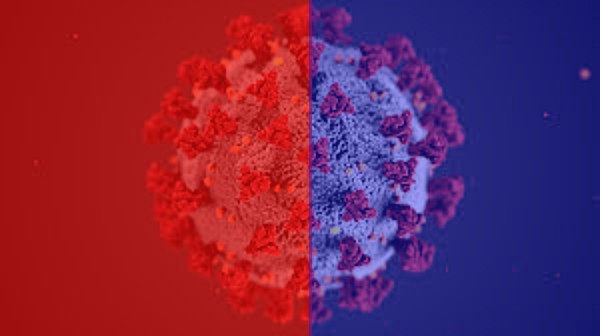The Political Pandemic: How Covid-19 Split the Country

Graphic courtesy of Naomi Engle (’24)
November 29, 2020
For months, people worldwide have been quarantining in their homes to combat the deadly coronavirus discovered in Wuhan, China, in late 2019. The virus has forced everyone from Canada to Japan to socially distance themself from others and avoid leaving their homes. But it hasn’t just separated us physically. Due to the strict regulations and mandates that people must follow for their safety, the virus, especially in the United States, has split the country politically, in a way we may never recover from.
The virus’s arrival came at an inopportune time, with the 2020 presidential election around the corner. Democrats began looking for a candidate who they believed would best handle these issues, while all citizens turned to the current administration, led by Republican Donald Trump, for answers. The administration responded by forming the White House Coronavirus Task Force (headed by Vice President Mike Pence) to coordinate all coronavirus-related actions made by the administration and its sister organization, the Centers for Disease Control and Prevention (CDC). Across the country, states began to see local stay-at-home issues ordered, the beginning of many months of lockdown to combat the virus’s spread.
Still, many citizens were unhappy with how President Trump had handled this issue, believing that he downplayed its gravity and mismanaged how best to fight the virus. Some of their complaints were that the Coronavirus Task Force was not sufficient enough and that the government leaving the task of handling the individual lockdowns to the governors was unwise. This group continued to grow in numbers, and by May 22nd, according to poll source Five Thirty-Eight, 53.7% of Americans surveyed disapproved of the Trump administration’s handling of the pandemic. Of the 42.7% who did approve, 82.3% were Republicans. This split between the parties continued, and by November 2nd, only 6.3% of those who approved of President Trump’s handling of the virus belonged to the Democratic Party.
Although the pandemic was initially not a political one, it has sparked a divide between the two major parties in other ways as well. Studies and surveys conducted by the Guardian, ABC News, and the New York Times have shown that throughout the pandemic, a significant fraction of the Republican Party has continued to draw on their rights: protesting the lockdowns, refusing to follow the mask mandates, and calling the pandemic a “hoax.” Democrats and Republicans continue to clash on this issue, with many from the former party noting that the safety of the country as a whole is more valuable than the rights of an individual and many from the latter party arguing that the government has no right to take away their freedoms and force them to follow certain rules.
The context for this argument certainly varies, and there are more than two sides to this coin. Many of the people who protested the lockdowns did so not because of their freedoms but because they lost so much because of the pandemic. People who relied on work as their only income have suffered greatly, as well as those who now have kids struggling at home, without school to keep them active. Although there are many outliers, these studies show that, without them, the majority of the Democratic Party tends to favor safety over freedom, and vice versa for a large portion of the Republicans.
It’s clear that the pandemic has divided us and is another one of 2020’s many tests of our beliefs. No matter what party you belong to or your opinions on how the pandemic should be handled, whether dismissively or cautiously, we’re all in this together. As scientists worldwide work together to find a safe vaccine to treat the virus, it’s vital that people of every kind must come together to work towards the one goal that unites everyone: safety. Safety for our families, jobs, homes, and our own lives. It’s this safety that will carry us through the rest of the pandemic.